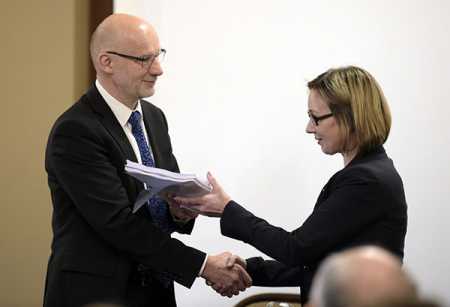|
Wed, 20 Apr, 2016 12:06:37 AM Social Barometer FTimes - STT Report, Apr 20  (From Left), the Social Insurance Institution, Corporate Relations Director, Professor Olli Kangas presented a preliminary proposal on basic income to Health and Social services minister Hanna Mäntylän in Helsinki on 30 March 2016. File. Photo – Lehtkuva. The majority of social welfare and healthcare (sote) leaders consider transfer of the basic income administration to the national social insurance institution Kela a good solution. The issue was discussed in this year’s Social Barometer.
Sote leaders of municipalities and joint administration areas in particular welcome strengthening of the customers’ equality.
The responsibility of granting and paying the basic social assistance will be transferred to Kela at the beginning of next year. Currently, the responsibility is a part of municipal social work.
In addition to sote leaders, social workers and Kela employees were asked about the transfer of this responsibility to Kela. Social workers were more critical of the two groups, but 70 per cent of them regard the transfer as the correct solution.
The Social Barometer was commissioned by the Finnish Federation of Social Affairs and Health (Soste). In the Social Barometer, many respondents said the transfer would reduce duplication of work by the administrations, as the client would deal with many different matters at one stop.
Social workers expect the transfer would reduce the time clients have to spend to access social services. There, however, are also those who are sceptical about the implementation of the transfer.
Some of the respondents said dealing with Kela is less stigmatised than that with the social office. They believe this will lower the threshold for application and reduce the underutilisation of benefits.
The Social Barometer’s findings imply that this change will require closer cooperation between Kela and the social services. Those who oppose the transfer fear impairment of personalised services, guidance and need assessment of clients. Kela’s ability to carry out, among other things, emergency aid decisions also concerned some respondents.
Those who oppose the transfer also raised doubts about Kela’s ability to determine a client’s basic income support needs and to further guide the client to municipal services.
“There are some clients who are likely to remain without social services, because Kela does not connect face-to-face, and on the basis of paperwork alone, Kela may not know who is in need of social services,” said one sote leader in reply to the questionnaire.
More News
|
|
Finland Times
| Monday, 12 January, 2026 |

